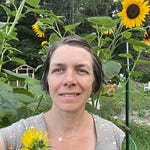Welcome to the first episode of Novitas Podcast! My partner Shay and I dive in talking about our journey over the last few years exploring systems of oppression, capitalism, and share the story the led to the beginning of this project.
You can find out more about the magazine at https://www.novitasmag.com. There are a dozen or so copies still available if you’d like to order one.
You can support the project and podcast by becoming a paid subscriber here on Substack.
If you have a person or project who you think is doing really awesome work in their community, please recommend them by emailing me at kel@novitasmag.com.
Thanks for listening!
TRANSCRIPT
Introduction: Welcome to Novitas, a podcast that explores stories about living outside the capitalist paradigm towards collective liberation. These stories are about building systems and structures outside the status quo at the ground level. The changemakers featured here are not famous or rich. They don't work for Fortune 500 or large-scale NGOs. They are everyday people who are interested in making a difference in the lives of the people around them. Their stories are stories of inspiration for those of us who feel stuck in a system where we have no power or control. Some stories are small. Others are bigger, but each features the success and challenges of trying to make change at the local level in real, tangible and pragmatic ways.
Kel: Welcome to the very first episode of the Novitas Podcast. I am really excited to start this journey. The first issue of the magazine was released this month, last month, I guess now. And the idea is to have the podcast each episode will give us the opportunity to kind of dive in deeper with each of the contributors to the magazine. But before I started talking to contributors, I wanted to give a little bit of introduction and some backstory to this project and myself. My name is Kel Smith. Over the last five years, I've kind of been on a journey to learn more systems of oppression, and how they operate, how they came to be, and what is my place in those systems. I've been writing a lot about this journey and sharing my thoughts through social media on Instagram and Substack, and I've been really fortunate to have the opportunity to learn from some amazing people on the internet, folks that I've connected with through those platforms. I am also a creative person and a community connector. So last year I had this idea to bring a lot of these people together from all over the internet to co-create a print publication and that's kind of how Novitas was born. But really that's just kind of scratching the surface of the story. Those five years have been an intense exploration and I wanted to share this introduction episode with someone who has been there through the whole process. My partner, Shay. Hi.
Shay: Hi.
Kel: Shay and I have been married for just under a decade. Um, actually I guess it's going to be 10 years this year. Um, we are very close. We run a home business together. We homeschool our kids together, and we spend most of our waking life together. One of the pieces of our relationship that I really love is that we spend a lot of time talking together. So while I've been sharing this journey about understanding systems of oppression online, I've also been talking about them pretty much every day in person with Shay.
Shay: Which is why I don't read much of your blogs.
Kel: That's okay, because he knows what's in them already, because he's the first person that I talk to. When I have an idea that hasn't solidified in my brain yet, I kind of bring it to Shay. So we've very much been on this journey together and I don't know if we can necessarily start from the beginning because...
Shay: No, no, we don't have that much time.
Kel: And I think if you went back to the very beginning, we could kind of pick apart pieces of our childhood and upbringing that have brought us to where we are now. But when I talk about the beginning, I often refer to unschooling kind of as the beginnings of my understandings of systems of oppression. So we started unschooling the kids six years ago, six and a half, and unschooling, I think, was a bit of a hard sell for me at the beginning because I was still very much kind of indoctrinated into the belief that kids need to learn through curriculum, through forced education. But you kind of were okay with it right from the outset.
Shay: It was an easy sell for me because the system for me didn't do a whole lot and I feel like I learned very little in school. And I did most of my learning when I was outside of school and most of my learning when I graduated high school. There was one thing that always stuck with me and it was one time you said that the one thing about unschooling or de-schooling is that you need to learn to trust your children and that they'll turn out to be normal and hit their milestones at certain points and all that stuff. But the one thing that you taught me was that you have to learn to trust your children. I have always remembered that, days of frustration and stuff like that.
Kel: During the disagreements.
Shay: During the disagreements. I've always just come back to trying to worry about the kids but just let them be themselves. Because I see where we are now, six years into it, seven years into it, and I see progress and I'm happy with the people that the kids are becoming and all that stuff.
Kel: That's it. One of the pieces that came out of unschooling for me that I really didn't expect but like it was never a focus when I started unschooling but it quickly became a focus when I started to understand unschooling and the implications of it is the ideas around adultism or childism and using age as a system of oppression. And not just, I guess, the difference between adults and children, but especially in modern education system, how kids are treated as lesser than compared to teachers, staff, whatever. And I think that was a big part of it for me when my mom says, so when are they going back to school? I can't actually imagine at this point in my life or their lives asking them to go back into that type of environment after they've experienced what it's like to live in non-oppressive relationships with adults.
Shay: Yeah. I think they're smart enough that they could understand that they're not lesser than if they did choose to go back to the school system. But I know that it's not going to happen anytime soon.
Kel: So one of the things that our unschooling journey taught me though out of that is that there are these kind of systems of oppression. And I often refer to unschooling as kind of the gateway for me unpacking a lot of that. There was a whole bunch of stuff that happened at the same time. There was the pandemic hit, we moved out to the country, the murder of George Floyd and the beginning of the Black Lives Matter movement. And then just my, I feel like my life for a period of time there became a whole, like just about educating myself. I think the anti-racism movement was a big piece of it for me because I didn't realize how many racist views I held. That I wouldn't have considered myself a racist person, but when I started to educate myself through like social media platforms during that period of time, I was like, oh shit, I really am quite a racist person. I hold these views and I never intended to uphold these systems of oppression. And I think I wouldn't have been able to recognize that if I also hadn't been doing the work through unschooling to try and treat my kids with more respect and remove a lot of that kind of power over dynamic. There was a lot of unpacking.
Shay: Yeah, there was.
Kel: An immense amount of unpacking.
Shay: Yeah, and I... I didn't consciously recognize that I was part of the systems of oppression. It was just like, how do we move forward? And I guess the thing that we have experience is with the children and the school system.
Kel: Well, it's something that we have direct control over, right?
Shay: Yeah.
Kel: It's something that we can take control of in our lives, in our kids' lives. In a lot of cases, the systems that we're dealing with don't feel like systems that we do have control over because they're so big and they affects so many people. So when we talk about improving the lives of people of color or improving the lives of you know people of low income or that are experiencing homelessness, we don't feel like we have a lot of control over that. But we do have control over certain aspects of it and the obvious one is with our kids. But also I would say I don't know if it was in tandem but it feels like around the same time there seemed to be a very... maybe even a little before... there was a really obvious decision that we made as partners in life to try and not work for other people. Not work for... we could see like we talked almost ad nauseam about making money for other people and being treated like shit at our jobs and not being valued as people and like
Shay: job jumping...
Kel: A lot of job jumping and trying to find a good place where like We just wanted to be respected as individuals and people and not have to suck up to people and not have to play that game. So I think that was even prior to the whole unschooling thing, but it seemed really clear that we were trying to opt out of that system as well.
Shay: I think unknowingly, just trying to find the better way and then deciding. I think the homeschool and the self-employment thing was all in the same calendar year.
Kel: And I don't think I would have considered myself anti-capitalist at that period of time, but I think there was during that whole shift, there was also like the whole shift with the unschooling and anti-racism. There was also a shift that I think we were both making towards undoing the cultural narrative around capitalism.
Shay: I think we had like a massive shift. It may not have been the same calendar year, but I feel like it was within 12 months where we made these conscious decisions. We went through a very large transition period there, but again, I don't think we would've identified ourselves as anything other than just doing what we wanted to do.
Kel: Yeah, independent, self-sufficient kind of thing. And when we moved up north, that was very much on the forefront of my mind is like self-sufficiency.
Shay: Yeah.
Kel: And it aligns with whole business and whatnot.
Shay: Unfortunately, it's individualist and self-preservation mentality and all that shit.
Kel: And I think being up there, we realized that, right?
Shay: Well, and that was a total separate mindset that we had where I think you wrote a blog post about it was like it was you know we're alone we have we have each other we have we need but you're not... We're not helping to work towards collective liberation. We're not working towards ending systems of oppression. We just...
Kel: We're just opting out.
Shay: We just removed ourselves from those problems and...
Kel: That's it. But they're still there. And affecting everybody else.
Shay: And there was that one quote that you said was, not everybody wants to... fix the problems, they just want to have enough money to make sure the problems don't apply to them. That's another one that stuck with me as well over the years.
Kel: When do you think that shift happened for you to deprioritize entrepreneurialism or money in general?
Shay: It was like a three year transition for me. I was bred to make money. Like for an individual or a boss or somebody.
Kel: I think we all are.
Shay: It was instilled for me at a very young age to work really hard and put in the hours and your job sucks but that's just the way it is because you got to earn a living and we've been really really fortunate like and I do not like... I do... I don't know how to say this, I do not not recognize how fortunate we are you've run this style of business that we run currently and have it work yeah for the most part
Kel: for the most part
Shay: most months
Kel: yeah I was gonna say I think it's important to recognize that like we're not pulling in money hand over fist but we pay our bills and we're making a baseline income and the desire to grow the business beyond what it is right now has kind of left.
Shay: Yeah, I'm quite satisfied with how much money I make and I'm quite satisfied with how we're raising our kids and I want more but...
Kel: not at the expense of our own well-being.
Shay: Not at the expense of, and I've been there, I've been, but again, I recognize the massive privilege that I have, that we have being able to do what we do.
Kel: Yeah, I think there is, and we touched on this a little bit before, talking about moving up north and like moving away from the city with the desire to be self-sufficient, but also with the desire to like opt out of these systems that we could recognize that were harmful and trying to find better ways, and I think that's what I did for a long time, fueled by Instagram I guess. But this thing where it's like, we can build something better, we can do it differently, we can do it differently with our kids, we can do it differently with our business, we don't have to opt in to nine to five culture or like boss babe daily grind. I mean, everybody's gotta take their own path and I think I'm at a spot now where I can recognize that there are many different paths. But I think the spot that I get tripped up on is often people will justify putting their kids in school or you know trying to make as much money as possible and that those justifications just kind of continue to uphold the systems that oppress others.
Shay: Yeah and it's unfortunate. There are people who have no choice but to rely on public education because they have to go to work, because they have to pay their bills, let alone if you live in the US and you have medical expenses or you have to pay for your car. People get stuck in these situations and it's...
Kel: And you do what you can.
Shay: And unfortunately that's where you've like literally every conversation ends blaming capitalism.
Kel: But it's true.
Shay: But it's true.
Kel: I've read a fair bit in the last, even in the last month, with all of the fucking shit that's going on in the US with the elections and with the Supreme Court decisions that are coming out in the last few weeks. And of course, with the genocide that's happening in Gaza, that we're shifting from this stage of like late stage capitalism to end stage capitalism because so many people are falling at the bottom. They've just criminalized homelessness where an entry level home costs a million dollars. Like piggybacking on the notion that we are now entering this very, fractured end stage of capitalist culture and economy, everybody says it's time to hunker down and start building community. I'm really excited to be back in the city and trying to tap into the networks and systems that already exist here. Not just like opting out for us as individuals, but really building up those networks and new systems for community, for multiple people, of their income so that they don't have to pay to be part of it and all that good stuff. I will say that I think one of the things that's really beautiful about running our own business that's meeting kind of our baseline needs is that it opens up the opportunity to try other projects and do other things. I don't think I would have started writing the way that I've been writing for the last few years if I had to work a job. I don't think I would have had the capacity or the space to be able to think about the things that I've been thinking about, for us to be able to talk about the things, because when you're inside of the system...
Shay: you don't have any time to think about it.
Kel: You don't. There's no spoons. There's no energy. You're just really trying to get by. So having that baseline met means that I could go volunteer with Eat Local Grey Bruce and doing different publications and so I'm really excited that we've landed at Novitas and I hope for you dear listener that this story kind of helps frame how I landed here to do this magazine based on the experience of having gone through this huge kind of tumultuous period of questioning the systems and finding answers out there on the internet and meeting all these other people that are also doing this work at the same time. And I guess the other piece that's part of the magazine that is really important to me that I want to highlight is that I think that the solutions to this end stage capitalism, this community building, have to come from the ground up. And in most instances, the coolest shit that I've seen out there is individuals taking initiative to start something cool. Or even just like go out into their community and do something. It's not NGOs. It's not charities, it's not, you know, Fortune 500, there's no techno solutions being thrown out there. It's really the...
Shay: It's in the community, like it's in your neighborhood.
Kel: Yeah.
Shay: Essentially.
Kel: So those are the stories that I wanted to highlight and to feature, not just so that like you could tap into them yourself, but so that you can find inspiration about what is working in other spaces. It's not always cookie cutter like here's the ten steps that you can do to build community in your neighborhood. But a lot of the topics cover things like economics, like parenting, like education, homelessness, how do we exist inside a capitalist economy while also trying to divest from it. And I think one of the cool things is that there is no one way. There is a million ways. And I think the success of building local community is gonna come often from the unique circumstances that exist in that community, right? And problems are only going to be solved when they're designed for the unique situation and people that are existing as part of that problem. But I think the universal, you know, framework that you can apply to doing this type of work is to use the tenants of collective liberation. You know, when we're building new systems, we're not just building it so that my life can be easier. You have to unpack and really distill what the problems are so that you can solve them in a way that is not imposing oppression or domination over another subset of people. Because that's really been our approach, and I say our as like Western culture for the last 300 years, minimum, is when we're trying to solve problems for one subset of people, we often don't think about the implications for another set of people or on the environment or... or or or, right? So I've been reading a lot of Murray Bookchin lately, and he talks a lot about this, specifically from the environmental and ecological movements but when we're... looking at hierarchical systems we need to explore them not just in mans need to dominate nature or control nature. Bookchin will tell you that that's a reflection of man's need to dominate woman or man needs to dominate other man or man needs to dominate child and so that when we build out environmental solutions to things like climate collapse we also need to unpack our hierarchical structures within our families and within our communities. So dismantling all of that, so when we're building new solutions, keeping that in mind is really important, or else we're just creating more problems for a different subset of people.
Shay: More people fall out.
Kel: Right. So I'm really excited to explore these ideas and these topics with different folks that have contributed to the magazine. And the first issue of the magazine had 10 different contributors, and each of them have agreed to come on the podcast and talk a little bit about their article or their essay or their contribution in more depth with me. So stay tuned for those episodes coming up in the future. And thanks so much for listening to Shay and I chat here about the backstory of Novitas magazine.














Share this post